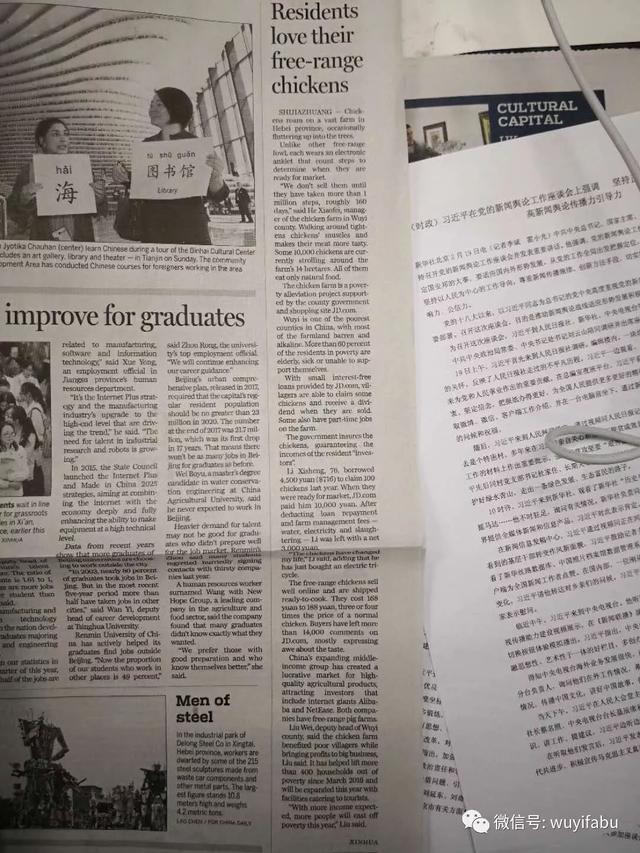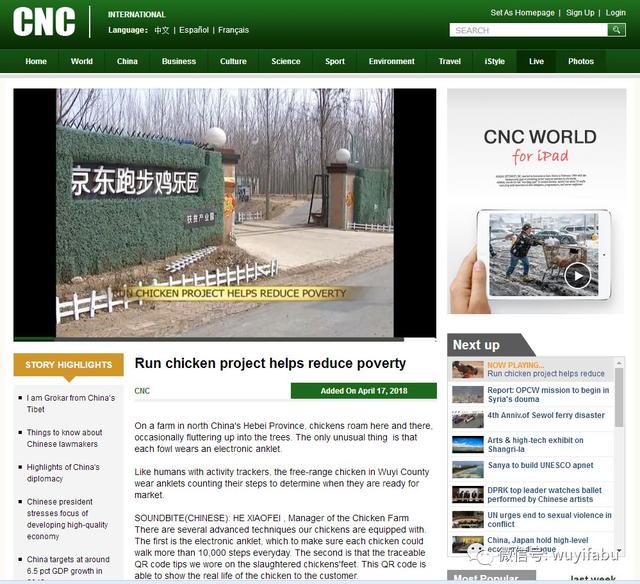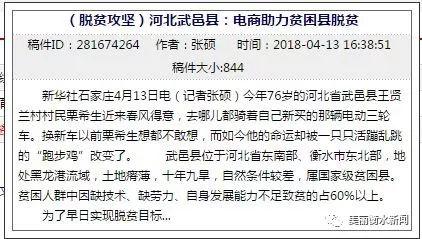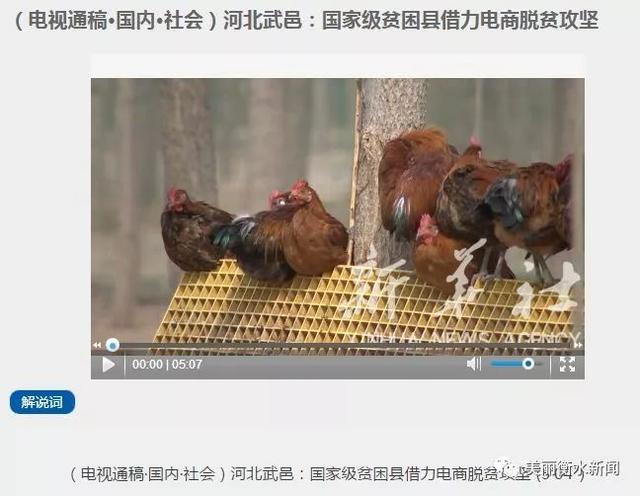繼國內各大媒體對武邑縣精准脫貧工作競相報道後,4月13日,新華社再次以中英文雙語文字通稿和電視通稿形式聚焦我縣借助電商模式助力精准脫貧。連日來,中國日報、海峽時報以及馬來西亞、文萊、新加坡等海外權威媒體紛紛聚焦武邑縣的精准脫貧工作。
我縣精准扶貧工作讓世界驚歎~~~
新華社中英文文字通稿報道
今年76歲的河北省武邑縣王賢蘭村村民栗希生近來春風得意,去哪兒都騎著自己新買的那輛電動三輪車。換新車以前栗希生想都不敢想,而如今他的命運卻被一只只活蹦亂跳的“跑步雞”改變了。
武邑縣位于河北省東南部、衡水市東北部,地處黑龍港流域,土地瘠薄,十年九旱,自然條件較差,屬國家級貧困縣。貧困人群中因缺技術、缺勞力、自身發展能力不足致貧的占60%以上。
爲了早日實現脫貧目標,2016年3月武邑縣政府與電商企業京東簽訂扶貧協議,利用當地林地多、生態好、交通便利等優勢,對傳統一家一戶散養模式進行大膽創新,成立“跑步雞樂園”。貧困戶可以通過小額貸款零成本認領生態柴雞散養,每只雞佩戴腳環,跑夠100萬步以上再由京東回購線上銷售,實現貧困戶脫貧和企業收益雙贏。
“跑步雞樂園”采取“托兒所”式管理,每名貧困戶將獲得的100只雞苗寄養于“跑步雞樂園”內,由園方統一管理,無需個人餵養。按照相關合約,“跑步雞”出欄時,京東以100元一只的價格收購,除去償還貸款以及一些管理費用外,每個貧困戶可以從每只雞獲得30元的純收入。2017年栗希生僅從“跑步雞”這個項目上就獲益3000元。
走進占地210畝的“跑步雞樂園”,首先映入眼簾的便是茂密的樹林下那一只只閑庭信步的河北柴雞。據介紹,整個“跑步雞樂園”共分爲14個養殖區域,現有存欄約10000只。
據“跑步雞樂園”負責人何曉飛介紹,每只“跑步雞”都有“先進技術”做保障:每只雞都佩戴了計步腳環,記錄它們的行走步數和行動軌迹,另外屠宰完以後有上市的白條雞也都有追溯腳環,可以把一只雞的狀態都真實地展現給顧客。
“‘跑步雞’扶貧項目已幫助453戶貧困家庭成功脫貧,對于帶動武邑縣脫貧起到了引領作用,實現了商業盈利和扶貧攻堅雙贏。”武邑縣副縣長劉威告訴記者,武邑縣高度重視電子商務發展,2017年各類電商銷售總額到達了20億元。下一步他們還將與企業繼續密切合作,擴大跑步雞養殖規模,借力打贏脫貧攻堅戰。
Across China: Run chicken run! Villagers count their chickens and their cash
SHIJIAZHUANG, April 15 (Xinhua) — On a vast farm in north China’s Hebei Province, chickens roam here and there, occasionally fluttering up into the trees. The only unusual thing is that each fowl wears an electronic anklet.
Like humans with activity trackers, the free-range chicken in Wuyi County wear anklets counting their steps to determine when they are ready for market.
“We don’t sell them until they have taken over 1 million steps, roughly 160 days,” said He Xiaofei, manager of the chicken farm. Walking about tightens chickens’ muscles and makes the meat more tasty. Some 10,000 chickens are currently strolling around the farm’s 14 hectares, all of whom eat only natural food.
The chicken farm is a poverty alleviation project supported by the county government and shopping site JD.com.
Wuyi is one of the poorest counties in China with most of the farmland barren and alkaline. More than 60 percent of poor residents are elderly, sick or unable to support themselves.
With small interest-free loans provided by JD.com, villagers are able to claim a number of chicken and get a dividend when they are sold. Some also have part-time jobs on the farm.
The government pays for insurance for the chicken, guaranteeing the incomes of the “investors.”
Li Xisheng, 76, borrowed 4,500 yuan (716 U.S. dollars) to claim 100 chickens last year. When they were ready for market, JD.com paid him 10,000 yuan. Deducting the loan repayment and farm management fees — water, electricity and slaughtering — Li earned 3,000 yuan.
“The chickens have changed my life,” Li said, adding he has just bought an electric tricycle.
The ready-to-cook chicken sell well online even though they cost 168 yuan to 188 yuan, three or four times the normal price. Buyers have left over 14,000 comments on JD.com, most in awe of the taste.
China’s expanding middle-income group has created a lucrative market for high quality agricultural products, attracting investors including Internet giants Alibaba and NetEase. Both companies have free-range pig farms.
Liu Wei, deputy head of Wuyi County, said the chicken farm benefited poor villagers while bringing profits for big business. The farm has helped lift more than 400 households out of poverty in the county since March 2016, and will be expanded this year, with facilities to cater for tourists.
“With more income expected, more people will cast off poverty this year,” Liu said.
新華社電視通稿報道
點擊左下角“閱讀原文”觀看我縣精准脫貧工作的詳細英文報道(視頻版)
爲家鄉發展點一個大大的贊~~!!!
編輯:呂鶴
審核:張靜





